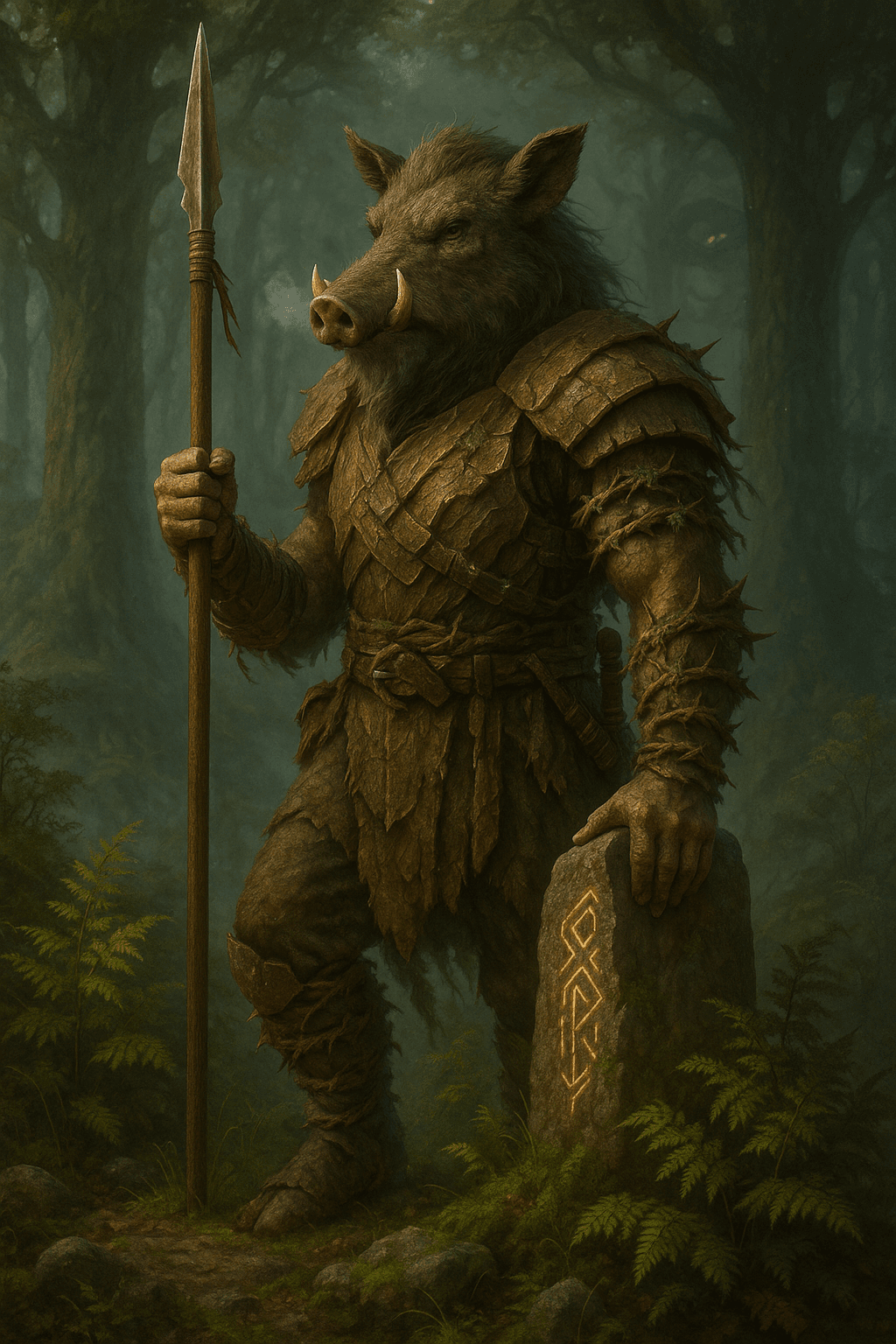Brambletooth
Stand where the roots say stand.

Before Galdrowen had borders or banners, there were glades people simply did not cross. It wasn’t law that kept them safe. It was a warden with a boar’s head, forearms braided in thorn-vines, and a voice like a log rolled across stone. They called him Brambletooth.
He was not the oldest of the Beastkin, nor the wisest. But he was the one who never moved when others took a step back. When wolves tested the treelines, he was already standing there, breath steady, tusks glinting in the undercanopy light. When wayward hunters from the hills wandered too deep, he herded them out with the same patience he gave to frightened fawns—firm, unyielding, but never cruel. The grove was a body, he said, and every body needs a spine. “If you run at the first ache,” he liked to growl, “you never learn what you can lift.”
In those first days of the Verdant Circle, when Elder Mossbeard gathered proto-druids beneath a newborn council-tree, Brambletooth took the watch no one wanted: the paths between heart-groves and the world’s noise. He had a talent for silence that didn’t feel sneaky; it felt respectful. He could stand for hours with one hand on a ley-stone, ear to the bark, reading the forest the way other wardens read tracks. His armor wasn’t metal but bark-plates stitched with root fiber; his weapons were a hooked root-axe and a short thrusting spear tipped with riverbone. He did not decorate them. “Pretty is for flowers,” he told an apprentice who asked. “Tools should be honest.”
When the Seeding of Hollowroot sent rumors of sentient vines twisting awake in the far mire, it was Brambletooth who walked the southern trails and came back with a sober report: the swamp was thinking. Not evil, not yet—just aimed. He advised sentries, not raids. “You don’t punch a shadow,” he said. “You light a fire where it wants to step.” His advice became the Circle’s first border practice: signal-fires banked under wet moss, thorn-hedges coaxed to grow in braided arcs, and listening posts manned by Beastkin whose patience matched his own.
At the First Contact in Swale Glade—Mossbeard’s cautious parley with Vineheart—Brambletooth stood in the open, spear grounded, tusks wet with dew. He was a statement no language could soften: Galdrowen would speak, but it would not bow. The meeting ended without pact or attack, and most called that a win. Brambletooth called it “a day the forest kept its breath.” He walked the returning line on foot, speaking the names of his patrol under his breath as if counting prayer beads. When asked why, he shrugged. “Names are handles. If something in the dark tries to pull them away, I’ll feel the tug.”
During the Withering Skies, when a dull pall drained magic from leaves and scaled slumbering dragons to a thinner dream, panic nipped at even the steadiest hearts. Brambletooth set a rotation—short patrols, frequent handoffs, no heroics—then took twice the watches he assigned himself. He showed the younger wardens how to sleep standing with a hand in a living trunk, and how to pace the same hundred yards a hundred different ways so the forest wouldn’t feel worn down by their worry. He visited Nuala the Spirit-Whisperer and asked what to do if the Grove-Wyrms failed to wake. “The forest will find another way to rise,” she told him. “Be there when it does.” He nodded, satisfied, and taught his patrol to braid a new kind of warning cord from fallen quills and stinging nettle—harmless to friendly hands, sharp to those who pushed without asking.
Not everyone loved him. He was stubborn, and his mercy came wrapped in instruction. There was the day he dragged a reckless poacher to the edge of a heart-grove, made him touch the roots, and say out loud what fear had made him do. There was the night he shouldered a charging boar-spirit rather than let it trample a sapling ring; he limped for months and refused all songs that might have eased the ache. “Pain keeps the lesson near,” he said.
But when storms flattened camps and strange mists crept to the bast-line, it was Brambletooth people found first, already there, already deciding that the line would hold. He had a knack for knowing where to stand—on a hummock that would not sink, on a root that hummed right, in a doorway of fern where his shadow looked larger than he was. And if you were very young or very tired, he had a way of putting his palm to the small of your back and lending you some of his balance. “Borrow this,” he’d say. “Bring it back when you’re stronger.”
Some say he never left the outer rings of Thornhall Grove, that one day he simply leaned his shoulder against a sentinel oak and kept leaning, until the bark grew over him like a blanket. Others insist he walks still, the sound of his tread mistaken for distant thunder. What is certain is the habit he left behind: wardens pausing at the start and end of every watch to touch a trunk and listen, as if a patient boar-voice might grunt approval from beneath the bark.
Origins made Brambletooth, but he made something in return: a culture of standing that turned fear into posture and posture into promise. Ask any border-runner who taught them that the forest doesn’t need rage to defend itself—only resolve—and they’ll say his name with a grin you can hear. Brambletooth, the Tribal Warden: loyal, ferocious, and stubborn in exactly the ways a living world requires.
